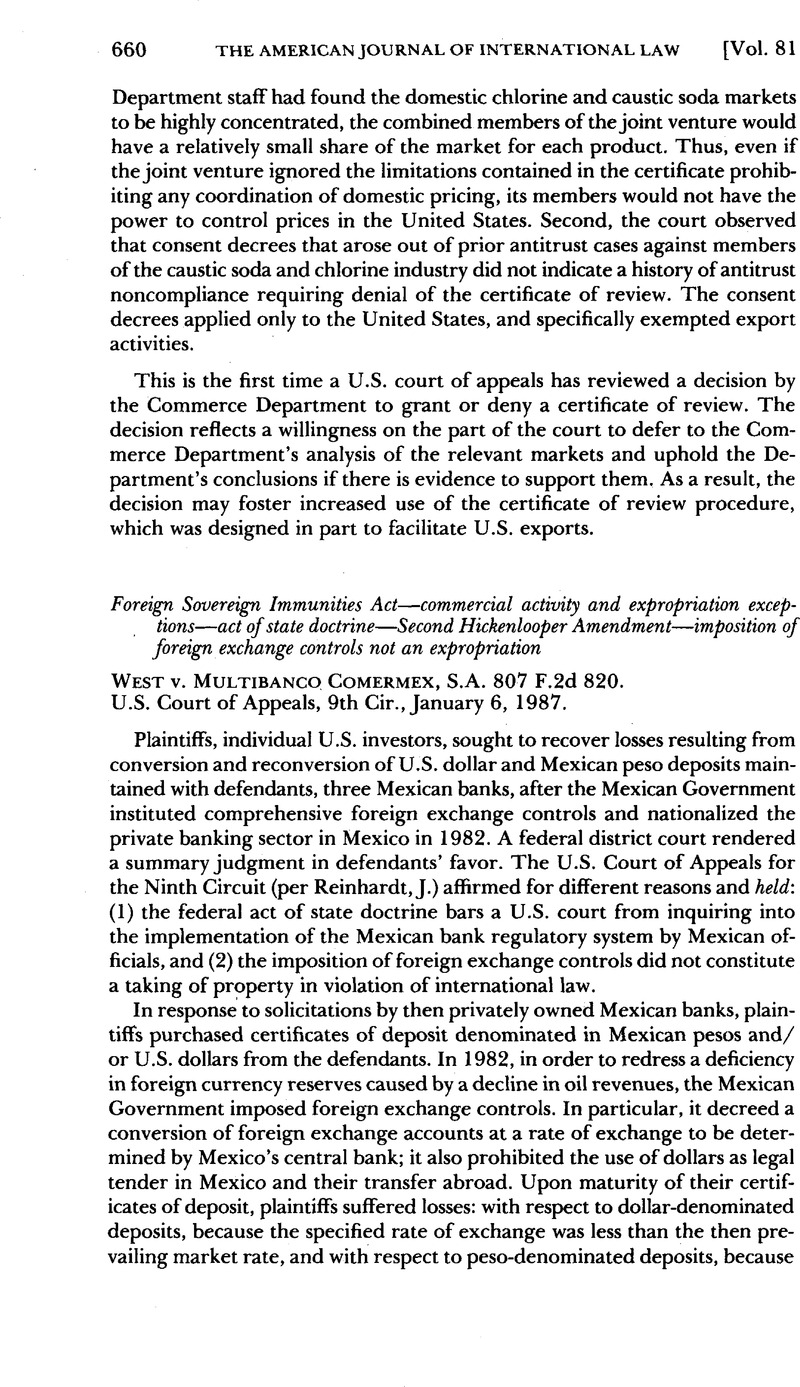No CrossRef data available.
Published online by Cambridge University Press: 27 February 2017

1 807 F.2d 820, 825.
2 28 U.S.C. §1605(a)(2) (1982) (no jurisdictional immunity if action of the foreign state is “based upon a commercial activity carried on in the United States by the foreign state . . . or upon an act outside the territory of the United States in connection with a commercial activity of the foreign state elsewhere and that act causes a direct effect in the United States”).
3 807 F.2d at 825 (quoting Jurisdiction of U.S. Courts in Suits Against Foreign States: Hearings on H.R. 11315 Before the Subcomm. on Administrative Law and Governmental Relations of the House Comm. on the Judiciary, 94th Cong., 2d Sess. 53 (1976) (statement of Monroe Leigh, Legal Adviser, U.S. Dep’t of State)). See also 28 U.S.C. §1603(d) (1982) (“The commercial character of an activity shall be determined by reference to the nature of the course of conduct or particular transaction or act, rather than by reference to its purpose”).
4 28 U.S.C. §1605(a)(3) (1982) (the so-called expropriation exception).
5 807 F.2d at 826 (relying on Bell v. Hood, 327 U.S. 678, 683 (1946); Restatement of Foreign Relations Law of the United States (Revised) §455 comment c (Tent. Draft No. 2, 1981)).
6 In Wolf v. Banco Nacional de Mexico, S.A., 739 F.2d 1458 (9th Cir. 1984), cert, denied, 469 U.S. 1108 (1985), the court held that certificates of deposit with Mexican banks were not securities because the depositors were “virtually guaranteed” repayment in full. 739 F.2d at 1463 (quoting and relying on Marine Bank v. Weaver, 455 U.S. 551 (1982)).
7 807 F.2d at 827.
8 Id. at 828 (quoting Underhill v. Hernandez, 168 U.S. 250, 252 (1897)).
9 807 F.2d at 828 and n.7 (relying on Clayco Petroleum Corp. v. Occidental Petroleum Corp., 712 F.2d 404 (9th Cir. 1983), cert, denied, 464 U.S. 1040 (1984)).
10 807 F.2d at 829 n.7.
11 807 F.2d at 829 (relying on Ramirez de Arellano v. Weinberger, 745 F.2d 1500 (D.C. Cir. 1984) (en banc), vacated and remanded because of subsequent legislation, 471 U.S. 1113(1985); Foreign Assistance Act: Hearings on H. R. 7756 Before the House Coram, on Foreign Affairs, 89th Cong., 1st Sess. 592, 607–10 (1965)).
12 807 F.2d at 830 (relying on, e.g., Foreign Claims Settlement Commission, Fourteenth Semiannual Report to the Congress for the Period Ending June 30, 1961, Panel Opinion No. 1 (revised) 124 (adjudicating disputes involving alleged takings of bank deposits by Czechoslovak Government); Christie, , What Constitutes a Taking of Property Under International Law?, 38 Brit. Y.B. Int’l L. 307 (1964)Google Scholar).
13 807 F.2d at 832.
14 Id. (quoting Restatement (Second) of Foreign Relations Law of the United States §198 comment b (1965)). The court also took notice of the fact that the Director of the Legal Department of the International Monetary Fund (IMF) had concluded that the Mexican exchange controls did not violate the IMF Articles of Agreement.
15 See, e.g., Callejo v. Bancomer, S.A., 764 F.2d 1101 (5th Cir. 1985), summarized in 80 AJIL 170 (1986); Wolf v. Banco Nacional de Mexico, S.A., 739 F.2d 1458 (9th Cir. 1984), cert, denied, 469 U.S. 1108 (1985); Braka v. Bancomer, S.A., 589 F.Supp. 1465 (S.D.N.Y. 1984), aff’d, 762 F.2d 222 (2d Cir. 1985), summarized in 79 AJIL 1054 (1985).
16 807 F.2d at 833. The court also noted that “[t]he actions of the government of Mexico and the losses they occasioned were within the purview of the risks associated with. . . potentially extraordinary returns.” Id.